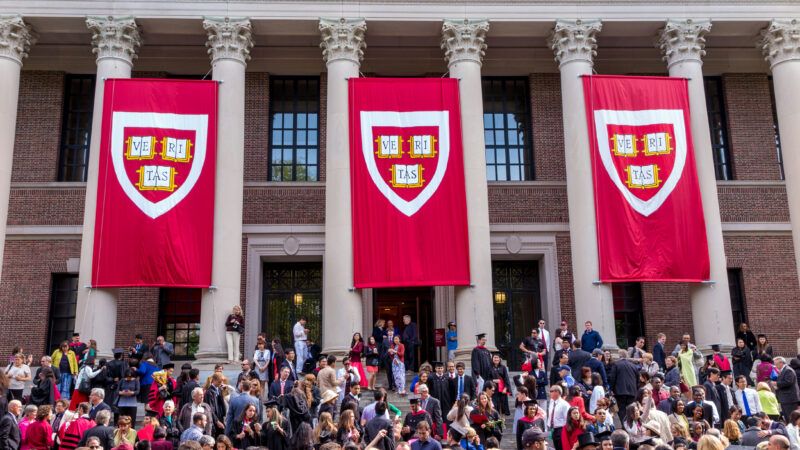Of Course Legacy Admissions Should Follow Affirmative Action to the Grave
There is no reason for public universities to grant preferential treatment to the scions of their alumni.

The Supreme Court has effectively ended race-based affirmative action in college admissions. On Thursday, the Court's six-justice conservative majority released opinions in two hotly anticipated cases—one concerning Harvard University, the other involving the University of North Carolina—ruling as expected that college administrators violate the Equal Protection Clause of the 14th Amendment when they cherry-pick the student body based on racial factors.
"Eliminating racial discrimination means eliminating all of it," wrote Chief Justice John Roberts in Students for Fair Admissions v. President and Fellows of Harvard College.
This outcome is a significant victory for principles of fairness, individuality, and nondiscrimination. It corrects a grave injustice that has persisted for decades. In 2003's Grutter v. Bollinger decision, the Supreme Court permitted colleges to use race-based admissions as a method of promoting diversity on campuses. This rationale never made much sense; the sharper defenders of affirmative action had tended to argue that the practice was necessary in order to correct the historical mistreatment of specific racial groups, not because of "the bizarre jerry-rigged 'diversity' sham," as Freddie deBoer describes it.
As a result of Grutter, institutions like Harvard continued to practice race-based admissions in pursuit of skin-deep diversity. The obvious and inescapable result was widespread discrimination against Asian applicants, who would constitute a much larger proportion of the campus body if not for admissions officers' penchant for crude racial stereotyping.
The Reason Foundation (the nonprofit that publishes this website) wrote an amicus brief last year urging the Court to rule against Harvard and UNC. As Reason's Emma Camp noted, "At Harvard, an Asian American applicant in the top academic decile has a lower chance of being admitted than a black student in the fourth-lowest academic decile." These were immoral policies, and today's landmark ruling offers a long-overdue correction.
Race-based admissions policies were also decidedly unpopular; 69 percent of poll respondents, including 58 percent of Democrats, opposed them. Perhaps that is why some critics of the ruling are adopting such a curious line of attack. Rep. Alexandria Ocasio-Cortez (D–N.Y.), for instance, took to Twitter to bemoan that the Supreme Court has ignored a more serious example of unfairness in higher education: legacy admissions.
If SCOTUS was serious about their ludicrous "colorblindness" claims, they would have abolished legacy admissions, aka affirmative action for the privileged.
70% of Harvard's legacy applicants are white. SCOTUS didn't touch that - which would have impacted them and their patrons.
— Alexandria Ocasio-Cortez (@AOC) June 29, 2023
This is an extremely silly point. The reason the Supreme Court weighed in on race-based admissions rather than legacy admissions is that the former was the issue being litigated. For the Supreme Court to consider legacy admissions, someone would have to bring a lawsuit about this issue.
But supporters of nondiscrimination can further overcome this criticism by conceding a basic point: Legacy admission—the widespread practice of giving preferential treatment to the scions of alumni—is, in fact, unfair and should be abolished.
Hundreds of colleges and universities around the country grant preferential status to legacies, and even institutions that officially disclaim this practice may still engage in it. My alma mater, the University of Michigan, has stated that "legacy status is not a preference in the admissions process but does serve as context—outside of the admissions review—in understanding a student's interest." Inside Higher Ed found this statement to be far from clear, and some students have affirmed that they were, in fact, legacy admits.
Michigan is a public university, and as such, it is accountable to the state government. It would be good policy for state legislatures to prohibit public educational institutions from considering factors such as legacy status. Indeed, there is no reason for a state school—one subsidized by the taxpayers—to prefer applicants who satisfy academically irrelevant criteria. Let the very best and brightest students thrive on the campus.
The very fact that legacy admissions still exist is not whatsoever a reason to oppose the curbing of affirmative action; eliminating explicit racial discrimination is obviously a noble goal in and of itself. But to any naysayer who disdains the Harvard and UNC ruling by saying that legacy admissions should face the same fate: Your terms are acceptable.


Show Comments (145)